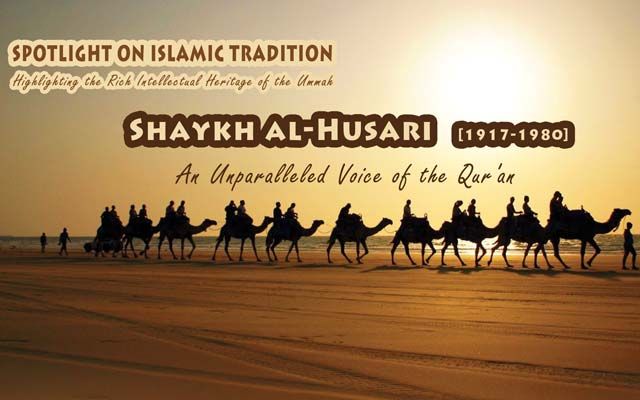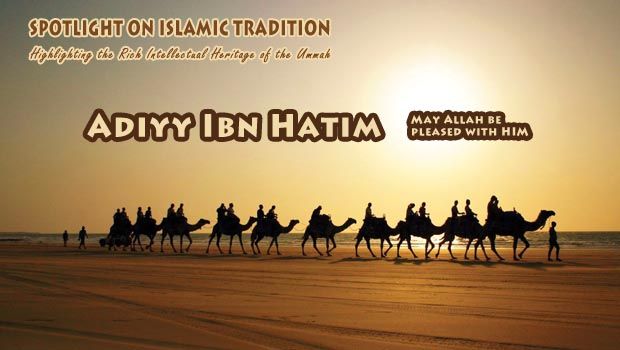In the narrative that chronicles the preservation of the Qur’an, Shaykh Mahmud Khalil al-Husari occupies a unique position. He was born in 1917 in the center of Tanta, Egypt, with an excelling aptitude for learning the Qur’an. He began his journey at the age of four with local Qur’an teachers and finished memorizing the Qur’an by the age of eight. Too young for admission to any of the Qur’an schools, he began to recite in the village mosques and quickly became a local sensation. As his voice matured, he was invited to gatherings and events to recite the Qur’an. When he reached the age of 12, he entered formal studies at the renowned al-Azhar University schools and completed formal degrees as well as attaining proficiency in the Ten Readings of the Qur’an.
In 1944, Shaykh al-Husari became nationally known when he won first place in a radio competition, and thereafter became a familiar voice in Egypt. He held various positions in the region’s mosques and religious institutions, as well as serving on several academic and government councils to advance the cause of the Qur’an.
His passion turned global as he became one of the first Qur’an scholars to travel widely throughout the world as an informal “Ambassador of the Qur’an.” He travelled to India in 1960 to recite at a conference in the presence of Egypt’s president Gamal Abdul Nasir and India’s Nehru, and went to Kuwait in Ramadan of 1963. He frequently visited the major Muslim nations, including Saudi Arabia and Pakistan where he was chosen as the head of an International Reciters Forum at a conference in Karachi in 1966.
His passion to spread the voice of the Qur’an did not exclude the West. He visited France in 1965 where ten individuals embraced Islam upon hearing his recitation. He visited the U.S. on multiple occasions in the 1970s, met President Jimmy Carter, and visited some of the oldest Islamic centers in the country. On one occasion, it is said that 18 men and one woman embraced Islam after hearing him. He was the first individual ever to recite the Qur’an in the U.S. Congress, the first to recite at the United Nations, in 1977, and in London’s Buckingham Palace in 1978.
A Rich Legacy
In addition to being a reciter, Shaykh al-Husari left behind a dozen written works on the Qur’an and its sciences, including a textbook on the science of Tajweed. His greatest legacy, however, is one that placed his name squarely on the historical roadmap of pioneers in preserving the Qur’an and advancing its status in the world. Shaykh al-Husari has the distinction of being the first person in history to record the entire Qur’an in audio media and preserve it for posterity. Although there were others who did partial recordings before his time, and many who did recordings after him, his work became preeminent for a number of reasons.
To begin with, he was simply the first to record the entire Qur’an. The story behind this project reveals a glimpse into his visionary spirit as well as the workings of destiny. Shaykh al-Husari was greatly concerned about the efforts of Christian missionaries, particularly in Africa, to spread confusion and doubts about the Qur’an. Moreover, this was the dawn of the age of electronic communication and the world was just beginning to take shape as a global village. Shaykh al-Husari used his influence and position to raise awareness of the need to preserve the Qur’an, in the spirit of its early pioneers, this time in an audio format.
The project had initially been presented to a number of reciters but never came to fruition due to disputes about monetary compensation and related issues. After exhausting these avenues, the matter returned to Shaykh al-Husari, who reluctantly agreed to do it. But he did it as a service to the ummah, without any monetary compensation. He did the same for all his written works, preferring charitable distribution rather than selling for profit.
Most importantly, his complete mastery and precision in articulating the letters and words of the Qur’an were undeniable. After the project’s completion, the recordings were presented to numerous scholarly experts, and it was only after all of them testified to its precision that the project was allowed to proceed. And to this day, with the unanimous and universal approval of the leading experts of Tajweed, Shaykh al-Husari’s crystal clear voice continues to resonate with divine beauty and power from schools, cars, audio players, and computer software throughout the world.
Finally, the ambitious nature of the project was also a key factor in its success. After recording the entire Qur’an in the rendition of Hafs in 1961, Shaykh al-Husari’s work was not over. He proceeded to do another entire recording in the Reading of Warsh in 1964 and additional ones in Qalun and Duri in 1968. He also produced another recording in Mujawwad form, a slower style of recitation, as well as one in a teaching style (Muzallam). These recordings have all been widely available since, and continue to our times.
In 1980, Shaykh al-Husari began suffering from a heart condition and ultimately passed away on November 24, 1980 after completing the last prayer of the day. Upon his death, he left a third of his wealth for charitable works for advancing the cause of the Qur’an.






